#I hope the story goes into a political campaign for Ozuno and he becomes worshipped without being a god and it’s all like hhhhh
Explore tagged Tumblr posts
Text
Onis, cannibalism and the above-divine power of human conscience in Touge Oni
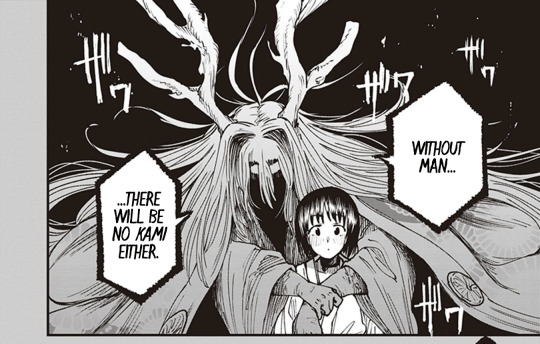
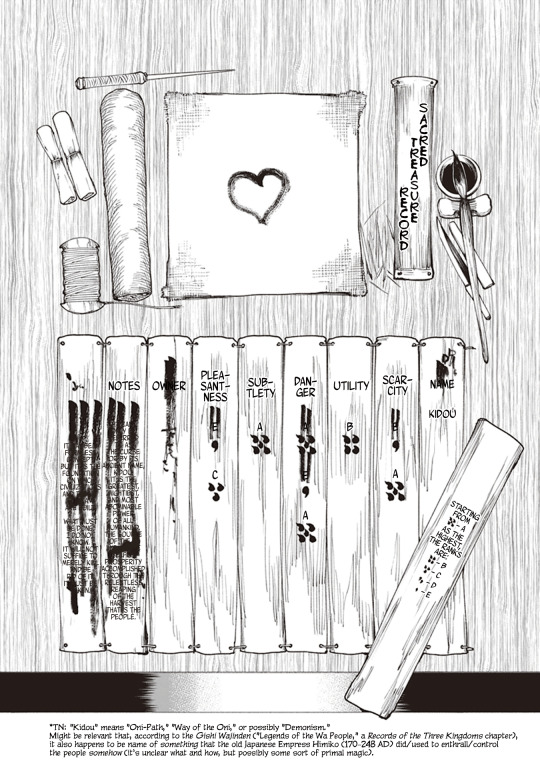
"It can only be referred to as the curse or by its ancient name, kidou (Way of the oni). It is the greatest, mightiest and most abominable power of all humankind. The source of the ??? selfish prosperity accomplished through the relentless reaping of the harvest that is the people. It [is] a be[???] formless concept but it is the foundation on which civilizations and t[he ???] kami are built. What must be done, I do not know. It will not suffice to merely kill and be rid of it, it must be taken." -Sansei Shounin Kozumi
Hello! Short opener because I want to get straight into it- Have you read Touge Oni? If you haven’t, stop right the fuck here and go read it!!!!!!!! Go read it go go go!!!!!!!!! With that said, I’ve been having this thought since vol 5~6 but I just did a full reread before going into reading volume 7 and I am only more confident now. Because of the nature of this analysis, word choices are very important, there is no official english translation currently and although I also read the manga in french, there is a high quality english translation by Penny Theater, thank you! The pages shown here are theirs.
There are 2 sections here to cover: what are onis and what is the power that be: what gives onis credence at all, what gives the oni curse power, what gives gods power. Going into these two things points us towards an answer to perhaps our current biggest question in the story— what the hell is the oni curse?
About Onis
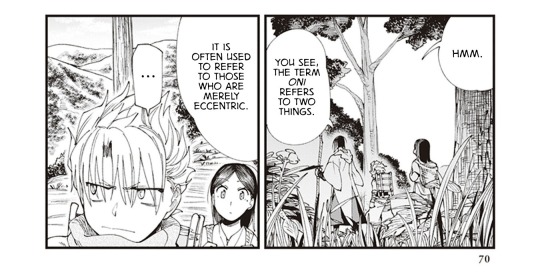
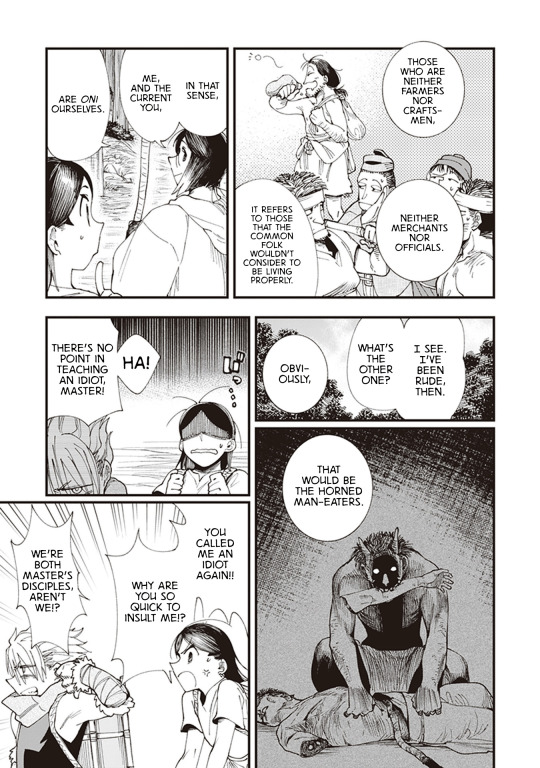
So, first I think we have to acknowledge the real life counterparts to the beings and beliefs Touge Oni references. In our real world, En-no-Ozuna, or En-no-Gyoja, is a half-historical half-legendary person that is credited for the creation of Shugendō, a religion. With this knowledge there’s a lot of fun links that can be made with the story, like how its religious practice involves hiking through mountain ranges (Touge Oni: oni of the [mountain] pass). Or how, Zenki (Zen’s alias) and Goki (future-Miyo’s alias in the first chapters) in legends are (mountain) onis that En-no-Gyoja rallied to his side, they pledged to renounce their evil and follow him. Shugendō means "the path of training and testing", which is also very reminiscent of themes the story has been pointing towards. "Let us, then, be up and doing, with a heart for any fate".
Ehem, all this to say, shugendō is a religion that’s very syncretic, which means it combines ideas a lot of different religions and schools of thought, including buddhism, taoism (remember that En-no-Ozuna in the story is referred to as an unaffiliated daoist monk), ainu beliefs and shintoism. For the purpose of this analysis, (including my lack of finding shugendō ressources about onis) that means it doesn’t narrow down what interpretations of onis may be relevant. In Touge Oni, many beliefs and religions similarly coexist pretty much seamlessly, and it even references several ancient texts on deities and whatnot, and the "canon" on the details of onis is pretty much unheard of from my research. I’m not a religious or Japan expert by any means but I know just enough to affirm that this sort of mix and mash is accurate to the era, beliefs coexist in ways that are sometimes not cut and clean. For this analysis I went diving into the wikipedia for onis and let me tell you that was an example of this, buddhism, shintoism, folktales, without mentioning non-japanese cultural equivalents subtypes and influences— there are so many variations of onis through time.
All this to say…! We can’t rely on historical depictions of onis to solve this, there’s no cheat code, we have to analyze through what Touge Oni gives us for the answers we seek. Even Touge Oni tells us how onis can refer to different things, oni not only being used for man-eating monsters but also for ‘eccentric people’, those who don’t fit in, those who people want to villify and dehumanize. Nevertheless, from the humble amount of research I did, I found a couple of real life examples that can give us something to work with:
— Akiko Baba classifies onis into five categories: 1: Folklore onis, associated with ancient ancestral spirits, especially earth spirits. 2: Onis associated with religions held by people living in mountainous areas, like the yamabushi (who follow shugendō!!! Yamabushi meaning, those who lie down in the mountain). (Baba-san please tell me your sources I need to find any sources on Shugendō-specific onis… Are you just talking about Zenki and Goki?!!) 3: Onis linked to buddhism, like evil demons (jakki) and devil figures from outside cultures like yakshas and rakshasas. 4: Human onis, bandits or violent people who became onis as divine punishment. 5: Onis from transformation stories, where someone transforms into an oni because of intense resentment or anger, especialy in nō theater.
You’ll notice here that many of these have interesting implications for Touge Oni onis, especially the human oni category! But also how Zen notably succumbs to his violent rage against Shounin has some similar implications to the transformation oni, and of course there’s the yamabushi oni, which as far as my research went mostly means onis who can be "tamed". Onis eating humans isn’t a constant, but it’s a very common (and often central) aspect of their presence as a myth.
— Lafcadio Hearn in his book Shokunjinki ("the man-eating oni") says that "those who have been greedy of their living are supposed to become gakis (starving spirits)" before falling into the Gakidō (the kingdom of starving spirits) after their death.
So here it’s greed that corrupts. This will be more topical in the conclusion section of my analysis, but for now let’s just piece all of this together and remember that there is half nature and half nurture to onis in most myths that are relevant to us here, half earned and half innate. In versions like in Touge Oni where onis were humans before being changed, they started out the same as anybody but through immoral actions or negative emotions have transformed into literal monsters, either as divine punishment or just the innate corrupting nature of their acts or feelings. Cannibalism is most definitely an immoral action haha, with or without the concept of sin, so this slots neatly into that. So that’s the earned half— But once you become an oni, something has been innately changed within your being, even if your actions were your own as a human— and like in Touge Oni, it’s not unheard of than an oni would want to reform themselves, but still quite uncommon for them to be able to or invited to, En-no-Ozuno’s act like in the legend to extend a helping hand to onis, offering to direct their life towards good, and for the onis to accept and join him… This is a big act of faith in these onis, these people, in that they haven’t been warped enough that they can’t enact any free will for good anymore.
Okay! Lastly for the only irl-historical section of this analysis… The onis in the oni village call themselves ayo-no-oni, or in its full name Ayo-no-Sato-no-Oni. It’s a one-eyed, man-eating oni that’s the oldest verifiable depiction of an oni in japanese literature (Izumo-no-Kuni Fudoki). Thank you Penny Theater! Fun fact, one of the irl origins for onis is thought to be miners and such, so the onis here being metal workers who have injured eyes from their work is a fun detail.
Okay, that’s all the obligatory context out of the way… Now, onto the mystery of the Touge Oni.
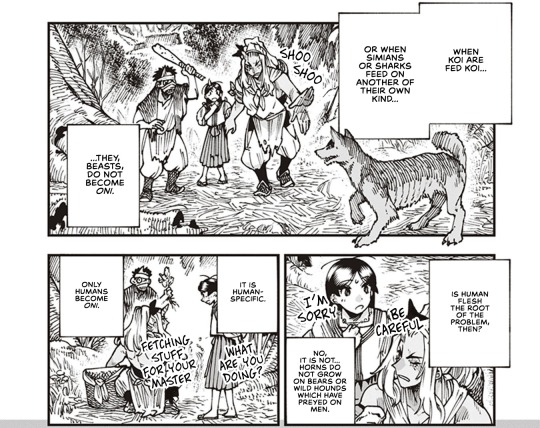
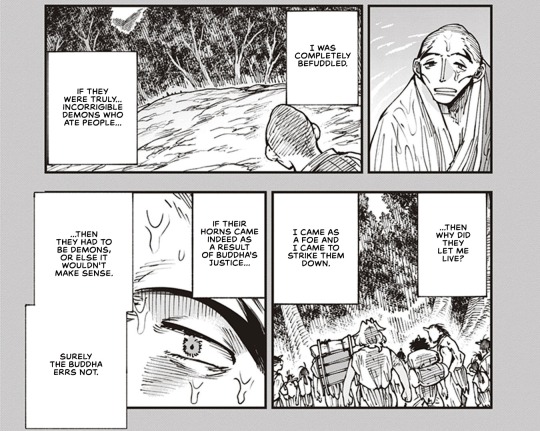
Cannibalism is the sole thing known to turn people into onis. Only humans become onis, and the only way to do so is eat human flesh. Like mister monk here, I think the oni curse being divine punishment in a strict sense is unlikely — and was disproven in the manga. But even then it doesn’t feel like the oni curse truly has morality attached to it, it seems like just a… Phenomenon. Uninterested in the circumstances around those it afflicts and impartial in how and who it develops and hounds.
And well… As we see soon enough, the kamis have no power over onis’ state. Like En-no-Ozuno points out it’s very unexpected, the extent to which kamis, especially ookamis and especially Hitokotonushi, should be unlimited, but it seems that this curse of the onis’ even has power over the kamis, is above them, something almost higher than gods in the hierarchy of the laws of the universe, maybe an innate energy or power of the world, like life.
Incidentally, there’s something that humans have and nothing else does, which could explain why the curse only affects humans, a power that becomes central to the story… Something like mantra.
Additional info would be that in Touge Oni, an oni’s horns have a huge focus on them. They’re often referred to as if they are what holds the curse, maybe are the origin of it, where the seed of the curse is planted, like if the horns fall from your head then the curse will just leave you as well. They’re the only visible trait of an oni in most cases, the first and most iconic one at least, and En-no-Ozuno has designed a way to "block" them from appearing through putting a hoop on blood vessels, to which Shounin points out that you can also block their "murderous urge" and "madness" in the same way, perhaps in a process akin to blocking chi flow, a concept that exists in some forms of medicine like acupuncture. The exact mental effects of being an oni are unknown, it’s implied that being an oni comes with side-effects of violent urges and a short temper, but we see with the village of onis that that’s not exactly… Relevant, or noticeable? A lot of this more fragile mental state could logically be attributed to what would push you to commit cannibalism in the first place, famine and horrible conditions that put you in a survival of the fittest mode, trauma and extreme circumstances. So in the end, the finer points of what it means to be an oni in-world are left vague. Different degrees of transformation exist, so to speak. Future-Zen in the capital chapter grows to an enormous size. The appearance of horns onto someone eating human flesh is immediate.
About mantra
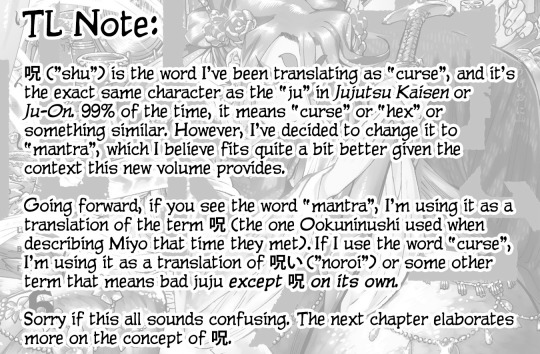
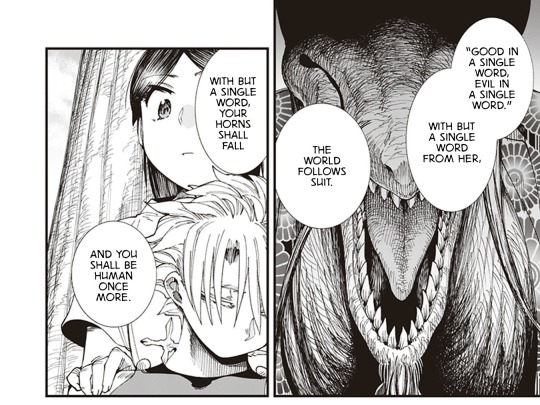
From the very start, Touge Oni places a lot of emphasis on the power of language.
Even every chapter ends with records of the sacred treasures being made/shown, religious writings and information archiving. The story references older stories for its own era, and also it very much has a meta dimension to it (that it spells out at the camera with its diegetic fourth wall breaking and timetravel shenanigans-), Touge Oni is a story from the old past of our real world reaching us readers through a book.
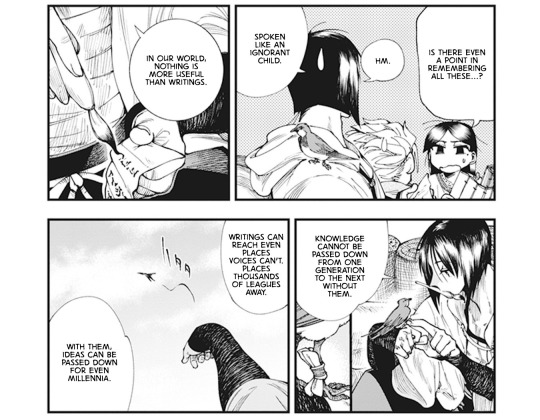
The manga ends up talking about philosophy a LOT, and strives to teach a way to think of life where you become aware of the gigantic infinite cosmic scale of the universe and without forgetting or undermining the meaning in a life, the joy to be had in the small things and deciding your own fate. These two aspects of the story, the importance of communication and philosophy, make the entrance of the concept of "mantra" (呪) fitting, smoothens it with coherence and intuition both.

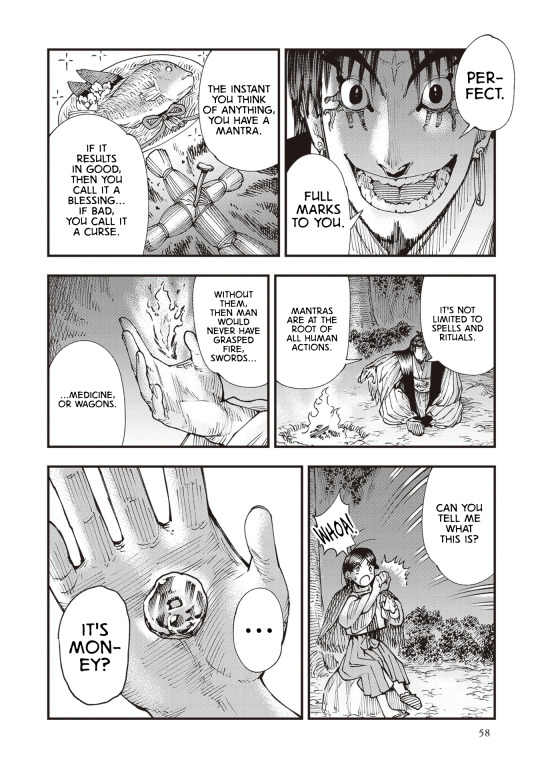

Mantras are thoughts, concepts, wants and will all wrapped into one word. Mantra is your conscience. Mantra is soul. Mantra is kidou.
Kamis see things like bonds between people, Sadera’s zenmiyo shipping goggles etc, and similarly Ookuninushi says that Miyo has a nice mantra after meeting her and it’s… Well, it’s vague, we’re unsure what to make of it, in meaning and measure. Most direct and substantiated theory imo is that she has nice willpower and life philosophy, like when she talks to Susanoo and he takes an immediate liking to her because of her words about life and joy and how to find happiness even in cosmic insignificance. But still! Vague as hell, in good part due to just how wide of a concept mantra is, even just hard to wrap your head around it and visualize it fully.
In the end it’s a pretty abstract concept, so there’s still much to finetune about how it acts and the philosophy around it. For example, Hitokotonushi says this about the nature of wishes and mantras.
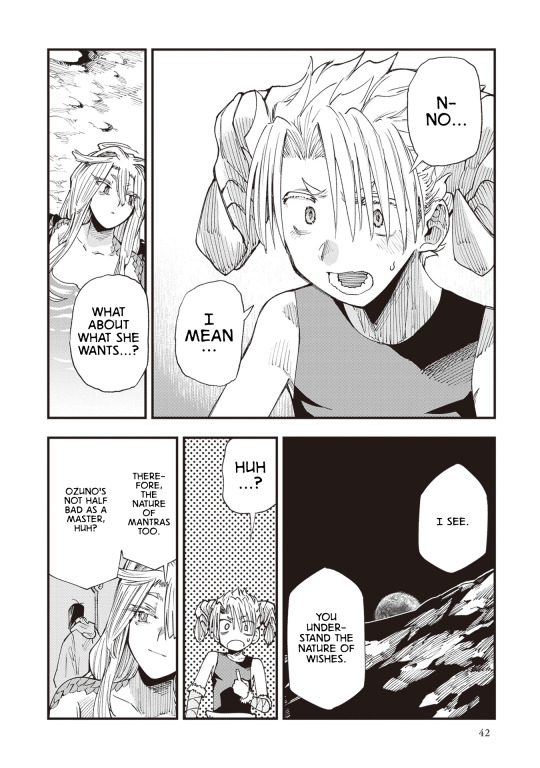
The nature of wishes and the nature of mantra… Perhaps she means how Zen understanda how a want affects the whole of the world, that everything is give and take and that when taking balance doesn’t stay the same. Something gained somewhere is something lost elsewhere, like in the ukei, gaining ground and ressources are things enemy man-grass cannot have, and all these things that Miyo taught them and did for them are things for which they in turn attributed to her, it generated thoughts and emotions and worship and mantra, Miyo gave and they gave back.
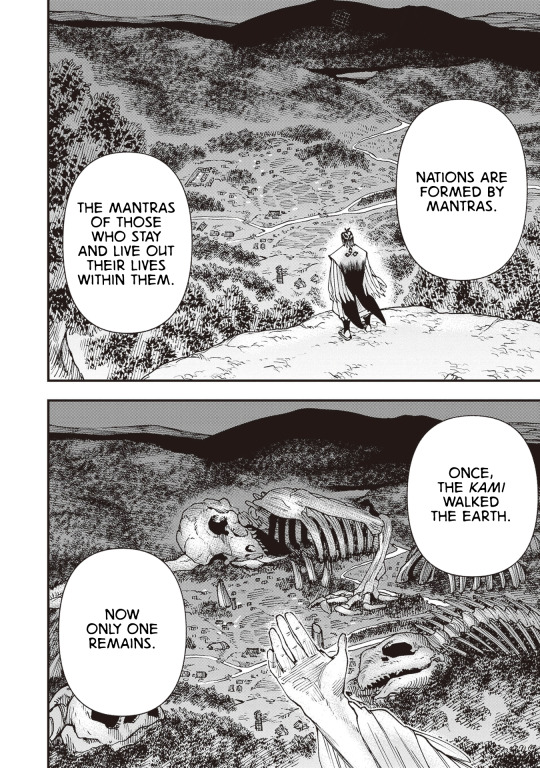

Mantras can be seen as the power to grant wishes… Interesting indeed. In this way, mantra, like worship points in the ukei, could rather be seen as an unlimited ressource that humans generate. Then, maybe it’s more that Zen wishing for Miyo’s feelings to be changed would be suppressing her mantra, rather than taking, disrupting the flow of this mysterious, powerful energy… Like disrupting chi.
But let’s step back! Kamis are made of mantra, "humans brought them forth through mantras and gave them forth". And THIS is why when a kami has less worshippers and gets less worship, less reverence and thoughts from people, they become smaller and weaker, enough that now most kamis can’t step outside their shrines, enough that some become microscopic when completely forgotten— Wait why are kanjis making up atoms and the fabric of the universe?
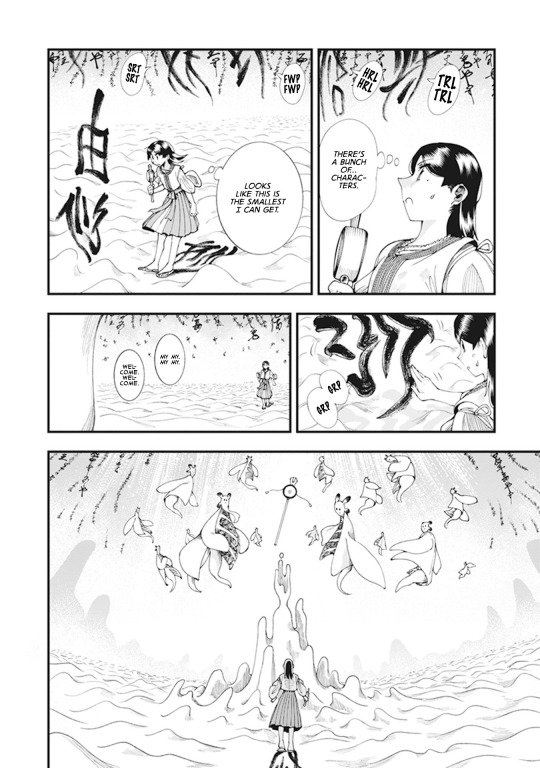
Let’s remember that when Miyo got smaller than microscopic, smaller than atoms, the essence of matter and time was writing characters. The kanjis here move, they seem alive almost. There is something divine about human language, human thought, in its essence. Many times we see how important consciousness and thoughts and will are important within the world of Touge Oni, how the concept of them exists and lives as a force. This is a kami talking abotu what resides in a black hole- death and nothingness yet everything that is.
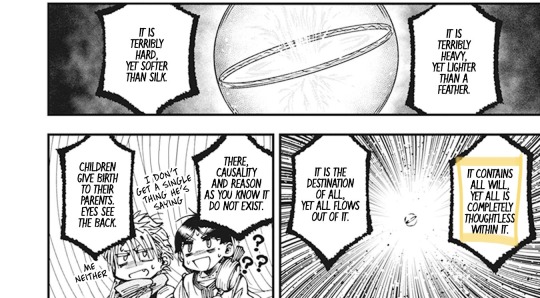
Who knows how much mantra truly has power over! Fascinating. But see, while having people’s indifference as a kami is bad, having their hate is worse. Like Hitokotonushi states, humans’ terror for kamis have turned into a plague over kamis. Hitokotonushi is an impossibly powerful kami that is by that virtue terrifying, and perhaps more importantly is a easy target for anger- with infinite power to grant wishes yet only grants wishes from people who successfully climb her mountain, even granting harmful wishes. The jealousy, the frustration, the injustice— there are so many reasons why Hitokotonushi would become a target for negative emotions, so many reasons she would have to flee to the moon to be far enough from humans, in fear of their sole mind’s will’s power.
So humans, their worship, mantra, people’s thoughts and feelings and conceptualization of a kami, are what gives kamis their status and power, and also what takes it away. Even more than simply taking what they have away, what they have given in the first place, mantra can curse.
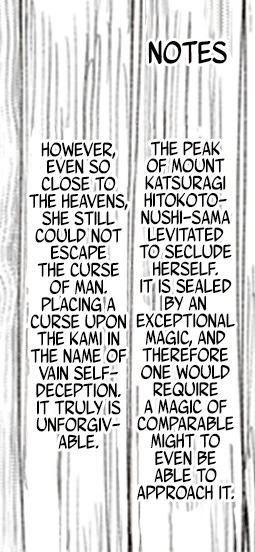
Let’s remember the description of kidou by Shounin that I opened this analysis with. "It can only be referred to as the curse or by its ancient name, kidou (Way of the oni). It is the greatest, mightiest and most abominable power of all humankind. The source of the ??? selfish prosperity accomplished through the relentless reaping of the harvest that is the people. It [is] a be[???] formless concept but it is the foundation on which civilizations and t[he ???] kami are built. What must be done, I do not know. It will not suffice to merely kill and be rid of it, it must be taken."
Kidou is mantra. The foundation on which civilizations and kamis are built. The mightiest power of humankind. The reaping of the harvest that is the people like harvesting worship points from man-grass. Shounin wants to save Hitokotonushi from her current affliction, something that can only be done by countering human mantra somehow, something kamis and even sennins, who seem to operate through a lack of mantra rather than under it like kamis, cannot do. It will not suffice to be rid of it, it must be taken, it must be given to the kamis to be self-sufficient, it must be presented to the divine. The oni curse is mantra.

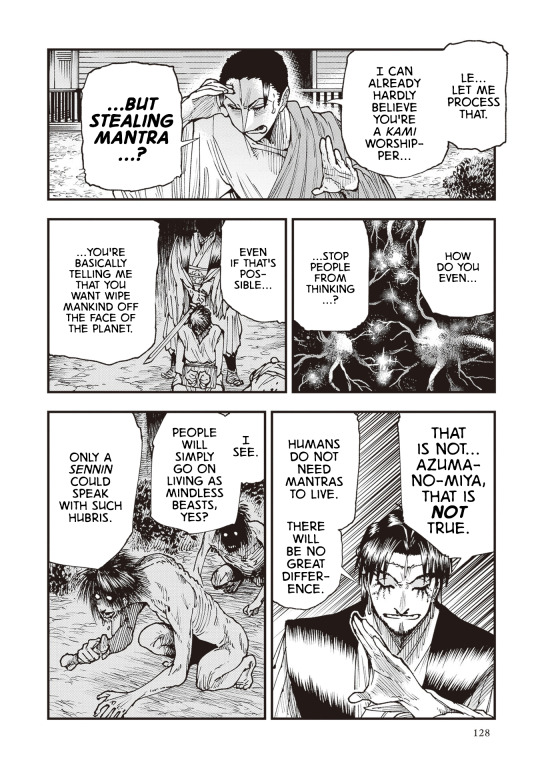
Shounin’s goal is saving Hitokotonushi by removing mantra. Although I think remove might be the wrong word— I theorized that removing mantra from humans could save Hitokotonushi either through directly removing the bind of human mantra upon kamis, or stopping the mantra from changing- deteriorating with time with less worship or turning to anger disrespect and terror, BUT his presentation to the divine consists in giving mantra to kamis- presenting it to them, hence my saying just earlier that this could instead be giving them the power of mantra, rather than just removing it from existence entirely. Instead of telling a fire it no longer needs fuel to keep going, you give it the power to feed itself wood and gasoline endlessly.
And just now I spoke of sennins in a way living without mantra- let’s get into that.
The final step to becoming a seinin is to walk through a town wracked by famine and misery without stopping or lifting a single finger. To offer no help and remain focused on the task to get through it above everything. It’s about leaving empathy behind and putting yourself above the situation, it’s about growing indifferent, as though the suffering of others even around you is inconsequential and doesn’t concern you.


To become a sennin is to leave the scale of thinking of humans, it’s to have learned as a human to think like kamis and see humans as small and meaningless within the cosmic design of the universe. Or rather, a type of transcending humanity that grows cynical, almost resentfully so, where emotions are worth less than nothing and cold logic reigns. But to what design, to what goal? The pursuit of spiritual ascendance is motivating and tempting enough for most, but we do see that some of what we see in Shounin are character flaws specific to him. The sennin mother was kind enough. Shounin talks like no one should care about anything if they are enlightened, but everything he does is ironically out of love for Hitokotonushi-sama.
This incoherence can probably be explained by the "reintegration" Shounin regularly does. We can look at the sacred treasure record of saiukou. "Regular disintegration and reintegration are necessary to keep personality-mantra coherence. Remember your heart." Something Shounin does to brute-force not fully leaving his feelings behind and remembering his goals? I hit the 30 pics per post limit so lemme just stitch the rest of the relevant sacred treasure record puzzle pieces together whike I’m here…

To ascend is to leave mantra behind. Somehow, to wield mantra is to be above-divine, it is incompatible with godhood or ascendance yet it influences and all is bound by it. It is a power that as a sennin you give up, a sacrifice instead of a granted wish, mantra is like the power to grant wishes and ascendance in true ascetism fashion is to, like Zen, refuse to use it and take.
Mantra, the human-exclusive level of thought and philosophy and communication and ability to visualize and build and want. The power of desires. The thing through which one can ascend or curse.
To become a divine being is to leave humanity behind, to leave humanity behind is to leave empathy and compassion and emotions behind. These things are however what makes us different from gods, what gives us powers over them, what makes life as insignificant man-grass worthy.
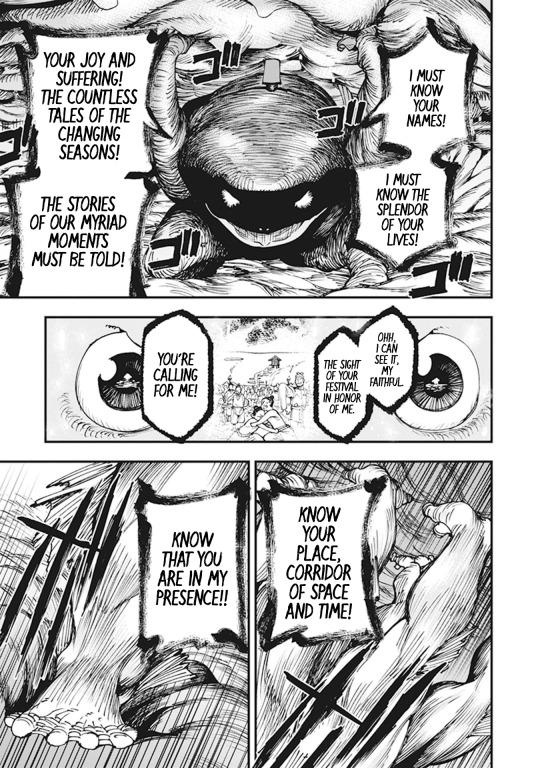
What is the oni curse?
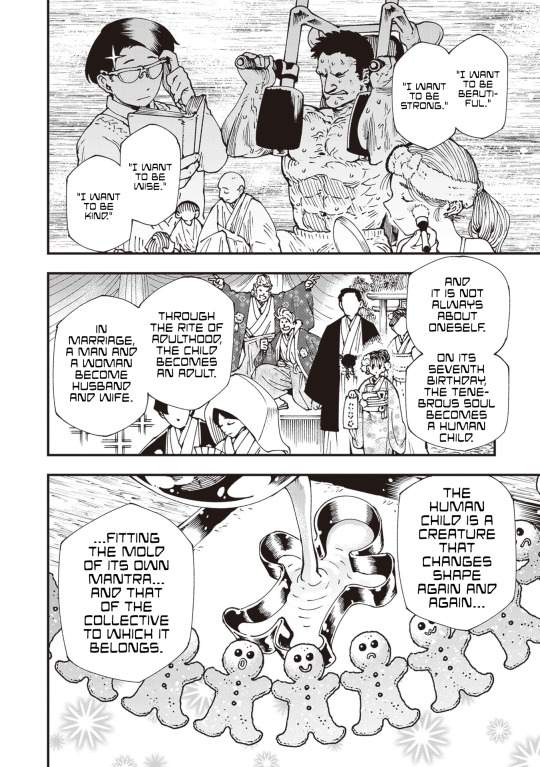
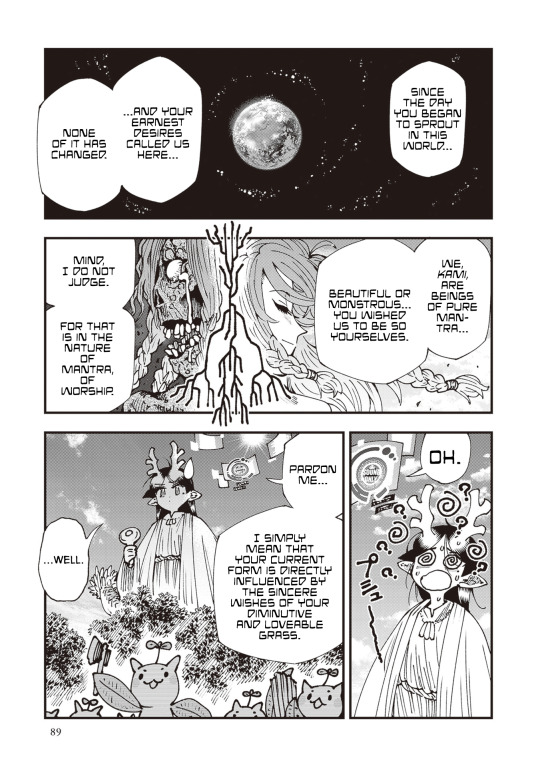
Kidou, the curse of the oni, as per Shounin’s explanation what civilizations and kamis are built on, what he seeks to take to unchain kamis. Kidou is mantra.
Okay so… The curse of the oni is mantra, but how? What does that even mean?
Well, we’ve learned that most things are ruled by mantra, aka human will and imagination. Becoming a sennin has to do with transcending your own, mantras are what empower and disempower gods. The oni, too, in text, is said to be directly tied to the power of mantra, it is what shuts kamis’ mouths. But sennins, unlike kamis, are not created by human’s mantra, sennins do not rely on humans’ worship (mantra) for their powers and so their mouths aren’t shut, they are outside of mantras’ reach.

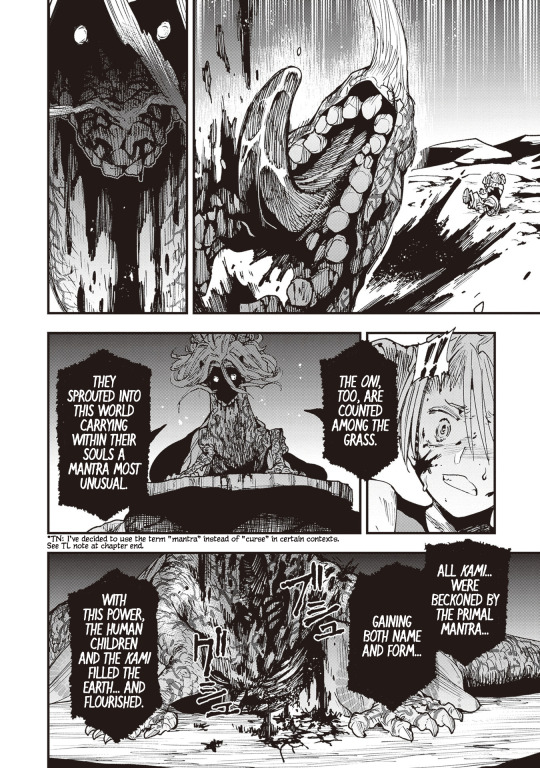

To remove an oni’s horns, their curse, by Hitokotonushi’s words is to rob them of their soul. To remove their oni curse is to remove the oni’s mantra. Which means the curse of the oni has tainted their mantra. The… mantra of the curse has tainted and fused with the person’s own mantra, the mantra involved in eating another human being has changed their own mantra innately forever until death. There’s a couple of different ways in which this could happen or for what reason, more precisely.
Human thoughts aka mantra, are what gives gods their forms, we are taught explicitly during the ukei that humans’ conceptualization of a kami dictates their appearance, wether they become a dragon or some other figure. Human mantra also has the power to curse gods- terror for a god becomes a plague that saps at their life and power.
A narrative then becomes clear, does it not? A koi that eats a koi remains a koi, a bear that eats human flesh does not become afflicted by an oni-like curse, the curse is human-bound. If it is the form-altering power of mantra that could curse onis into being, then… Human cannibalism is abhorred and demonized more than perhaps anything else, on a very innate and visceral level.
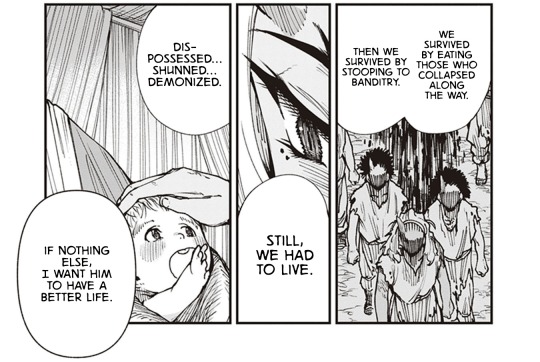
So by my favored theory, humans becoming monsters after doing cannibalism is that the intense judgement people who commit cannibalism face, this thought that immediately such an act makes them no longer human, takes form and manifests as a mantra that makes it true physically and spiritually— they not only become monsters but their very being is tainted, and since the stereotype of the average cannibal is a heartless emotionless bloodthirsty beast, that’s what onis are forced to become like on an intrinsic level. It is a more or less common myth worldwide, even just often a non-spiritual belief, that committing cannibalism saps at your humanity and turns you into something monstrous, like for example with the wendigo. Like we said earlier, onis are creatures of myth, and the biggest constant is that they are man-eating monsters. Mythical beings are somewhat like kamis, and since kamis can be of disaster or misfortune etc they can be believed in while still being negative in nature, so what’s to say committing an act that intrinsically changes so much about your spiritual state and your reputation in society, fitting the requirements for being an oni, turn you into one? A curse, placed on humans by humans, mantra, thought given form. It is no divine judge,ent, this is not Buddha’s doing, wether or not people can be "redempted" or wether they "deserve" it doesn’t matter, just the intense ostracization and dehumanization that the act inflicts upon you. Now anyone can see at a glance that you’ve committed such an heinous act, and the fear of onis continues on, as many are exiled ir isolated and encouraged to keep eating humans.
To commit cannibalism is to abandon your humanity. AbsoluteColor has an interesting theory centered on this. In their words, becoming an Oni might be something along the lines of transcendence, incomplete as it might be. In the Gabi trial, the aspiring sennin should shed his own emotions and go through a land devastated by war or famine without doing anything, and in a way the Oni who used other humans to feed himself had to shed his emotions, although they did so to gain something for themselves (food), making it a "stunted" transcendence...
My other theory is that since humans possess mantras, eating one breaks something/ fundamentally changes something in your being, either your spirit or body, because mantras are a power that can’t be consumed. So trying to consume it instead deflects it, channeling it in a way, and in this way becoming corrupted because something went wrong. But if it’s unrelated to the taboo as in theory 1 then it’d be weird that animals eating humans don’t become cursed- but the trouble could be that it’s a human eating mantra specifically, again that theme of a human’s special sentience being specially affected by things. Like, an animal doesn’t have the capacity to hold mantras so it slides off their back no trouble, but instead a human eating mantras is like trying to absorb or process it but it causes swelling past the bursting point. After all the process of becoming a god or something divine/above-human is a big topic, and we see how it changes someone and the strain that comes with it, the sacrifices, since by becoming a sennin you shed human emotions. In this reading human sentience itself is transcendant essentually, (and thus deeply affects the world,). Becoming a oni is to be chained by mantra, but the why exactly is up in the air, here it’s that eating another’s as a human, creature that generates mantra rather than being made of it like kamis and absorbing it within yourself messes you up, maybe because by digesting mantra you become made of mantra in some way, maybe the horns are pure mantra, part of them now. The other thing that makes this less likely is that the taboo theory offers some explanation as to why gods would be forbidden to speak about it despite knowing the details of it— it’s something so vile you cannot even speak of its origins, something sow oven into the laws of mantra and the universe that undoing it is unthinkable to even amatsus.
It could be a fusion of these. By consuming mantra you ascend to godhood in a way, and that is what allows one to become affected by mantra. Become bound by it. I’ve also entertained the idea that maybe it is their own mantra affecting their appearance, self-loathing and self-doubt and low self-esteem, your own consideration for your own humanity, after eating human flesh, that you no longer feel human or think you are monstrous. But it has low chances, because that can’t possibly be a phenomenon that always occurs impartially then, not everyone would think of themselves that way, especially with how out of it famine can make someone. This could be not unsimilar to this presentation of the divine deal, where you give the power of having mantra to a being only affected by mantra, onkt the other way around, where a being that generates mantra is now also commandeered by it, an essentialist tool of fate and the universe or something.
So,
to recap!
In my opinion either the oni mantra is strong because the taboo of it is strong, or because mantras are a tangible specially-corruptive thing when consumed.
Since the oni curse is mantra, removing it would have to be done through countering the mantra in some way, perhaps with a stronger positive one about how onis are humans like the rest of us or they can choose their own fate etc etc, or like what Shounin seeks to do to save Hitokotonushi from her curse, through removing mantra entirely.
The koi eats koi thing that the monk brought up is super interesting, any time a manga or japanese media touches on cannibalism it’s go-to example/case study to bring up, I regularly see it referenced even when I pick up a random manga. Asura by George Akiyama from 1970 is just one example. It seems koi eating koi is vey present in japanese consciousness… Which yeah is interesting— Kois are one popularized example but anytime we hear about animal species committing cannibalism we’re shocked by it, so it’s interesting how likely due to japanese exposure to kois it’s what sometimes haunts their stories. This sort of thing is visceral it feels like an innate wrong, so for talking about morality and nature and the innate status of things, yet the concept of higher sentience and how virtues are what makes humans special— it feels very emblematic and topical in many ways, and a very uniquely charged one.
I’m thinking that if they were to through with the Presentation of the Divine and the world became mantra-less Zen’s horns would fall. Which would be an interesting conflict because then Zen would have to consider "ok nice but is it worth trading for human sentience…", which ties back to the theme of wishes… Since human sentience is explicitly connected to mantras I feel like that supports the link I’m making here right, and how human emotions are something not below but rather above and inaccessible to the divine. Gods channel the power from their will through literal god powers that shape the world meanwhile humans can only channel their will through their actions, maybe it’s an inherent shift there that changes everything.
If onis have a strong mantra, and the kami, which are made of mantras, can’t undo the mantra of onis… Then perhaps, the same way that humans gave and take power of the kamis through mantras, humans are what made onis such a strong curse. Perhaps for the horns to fall, the devil’s mark as Ozuno said so fiercely once, the horns that are the mark of the oni, that give them their bloodlust and madness, then all it takes is for humans at large to stop fearing onis so— or rather, stop seeing cannibalism as an irredeemable act that strips your humanity from you forevermore. The power of thoughts is at the core of the story, and the intrigue with Shounin is baiting people to wonder, would it be so bad if that was taken away? Ozuno is tempted to go through with the Presentation to the supreme because it would cure his beloved, and if that were to cure Zen as well… Either from humans no longer being able to make mantras, or kamis becoming more powerful than the onis’ mantra, then that could be one more point of contention. I doubt Zen will be tempted, though, as someone who himself experienced it— survival at its rawest, mindless form. Hitokotonushi said it herself, that he understood the nature of wishes and thus mantras, with how he refused his second most important wish. Miyo herself is stated by people around her to have a fine mantra, a fine will and way to think, so I think that’s why our trio is the stuff of fate, the heroes of this tale. They have a bond so strong that the gods recognize it, and it’ll be because they’ll reach erudite knowledge on mantras and life without sacrificing their compassion or the perspective of a lowly human, baby!! Through shugendō, the path of training and testing, of trial and error and will to keep going!
Touge Oni is a lot about choice and willpower, carving your own path, the desires and ideologies and willpower and sentience of humans, how humans are both small vulnerable and insignificant on the scale of the cosmos and yet how such small beings can have so much impact and influence on the the world and their own fate— let us, then, be up and doing, with a heart for any fate. Miyo has changed the destiny the world thrusted upon her, herself bending time to change her own fate, Zen is determined to break his curse that’s stronger than gods and is already defying what should be dictating his life and behavior by acting upright and travelling with humans— humans are not divine but damn…… There’s something to us, isn’t there.
#Touge oni#Analysis#Theory#Another wip from a year and a half ago done <3#I hope the story goes into a political campaign for Ozuno and he becomes worshipped without being a god and it’s all like hhhhh#I hope Miyo stays human. Let her not sacrifice herself or smth please please please <3 Ukei was peak but STILL#Me saying I’ll make fanart for a ancient Japan fantasy manga and it’s a canon giant girl with mecha floating arms wdyd#throwing myself to the floor clinging to your pants sobbing pleaseeee read Touge Oni it’s funny insightful awe inspiring and just FUN#The plot twist that the sacred treasures records aren’t only being written by the same guy#but then the double plot twist that actually they might be??!!!!! Incredible 10/10 touge oni foreshadowing i fucking love you#No wonder a god can’t break the oni mantra if mantras lord over gods already! If that’s what gave them powers at all!#Mantra is pretty much the willpower and thoughts of humans manifesting.#Idk idk man i’ve spent so long wondering how to best phrase this so I rambled but touge oni just deserves all the discussions in the world#Primal gods in ancient times#The worldbuilding…. The meta commentary……… the religion system the everything… An-inseki my beloved
8 notes
·
View notes